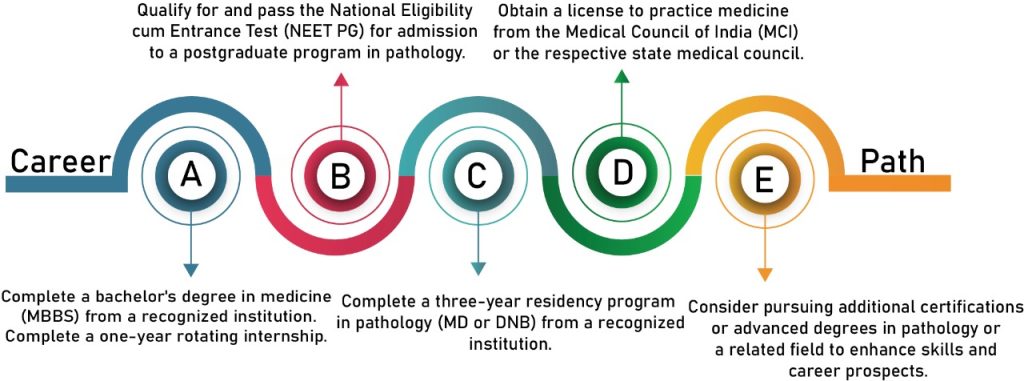Pathology is the study of disease and its effects on the body. It involves examining the physical, chemical, and molecular changes that occur in tissues and organs as a result of disease or injury. Pathologists analyze samples of blood, tissue, and other body fluids to identify the underlying cause of a disease or condition and to determine the best course of treatment. Pathology also plays an important role in medical research, helping to advance our understanding of the mechanisms of disease and the development of new therapies.

Work description
A pathologist is a medical professional who specializes in the diagnosis of disease. Their work involves examining tissue samples and body fluids, such as blood or urine, to identify the presence and extent of disease or injury.
Pathologists use a variety of techniques, including microscopy, genetic testing, and biochemical analysis, to determine the cause of a patient’s illness.
They work closely with other members of the healthcare team, such as physicians and surgeons, to develop treatment plans and monitor patients’ progress.
Pathologists also play a key role in medical research, helping to advance our understanding of disease and develop new treatments.
High Demand
Pathology is a highly respected and intellectually stimulating field that offers a sense of fulfillment from making diagnoses and contributing to patient care.
Lucrative salaries
Pathologists have a relatively flexible schedule, with some opportunities for remote work and a more predictable workload compared to some other medical specialties.
Opportunities for innovation
Pathology can offer job stability, as there is a consistent need for skilled pathologists in healthcare settings.
Versatility
Pathology can provide opportunities for teaching, research, and leadership roles within healthcare organizations.
Flexibility
The chance to work with other professionals in collaborative, team-based environments.
Job satisfaction
The potential to specialize in areas such as sustainable design, structural engineering, or building systems design.
High stress
Pathology can involve a significant amount of time spent working independently, analyzing data and specimens in a laboratory setting.
Long hours
Pathologists may face emotional challenges related to the nature of their work, such as dealing with the diagnosis of serious illnesses or the autopsy of deceased patients.
Competitive field
- Pathologists may face pressure to meet production quotas and turnaround times, which can lead to a stressful work environment.
Constant learning
Pathology can require a significant amount of training and education, including medical school and a residency program, which can be expensive and time-consuming.
Isolation
The need to stay up-to-date with evolving technologies and industry trends, which may require ongoing education and training.
Eye strain and other physical health issues
The potential for competition for jobs, particularly in areas with high demand for architectural engineering services.
The cost of pursuing a career in pathology in India can vary widely depending on the specific education and training path one chooses. To become a pathologist in India, one typically needs to complete a medical degree (MBBS) followed by a postgraduate degree in pathology (MD or DNB).
The cost of MBBS education in India can range from approximately 10-25 lakhs rupees, depending on the institution and other factors. Postgraduate degrees in pathology can cost an additional 10-25 lakhs or more, depending on the institution and program.
Additional costs to consider may include books, equipment, and exam fees. Scholarships and financial aid may be available to help offset these costs for eligible students.
[wpcharts type=”horizontalbarchart” bgcolor=”red:gray:yellow,blue:gray:yellow,random:gray:yellow,purple:gray:yellow” min=”0″ legend=”true” titles=”2 year , 5 year” values=”3,7,5,12″]
The earning potential of a pathologist in India can vary widely depending on factors such as years of experience, location, type of employer, and specialization.
On average, a pathologist in India can earn a salary ranging from around 6-20 lakhs rupees per year, with higher salaries typically seen in metropolitan areas or with experience and expertise. Pathologists who work in private hospitals or clinics may earn more than those who work in government hospitals or academic institutions.
Pathologists who pursue additional certifications or advanced degrees may also be able to command higher salaries.
Overall, pathology can be a financially rewarding career path in India, particularly for those with a strong educational background and a commitment to ongoing professional development.
[wpcharts type=”horizontalbarchart” bgcolor=”red:gray:yellow,blue:gray:yellow,random:gray:yellow,purple:gray:yellow” min=”0″ legend=”false” titles=”Entry-Level, Mid-Career, Senior-Level ” values=”5,15,25,35,45,55″]
Strong interest in science and medicine.
Good analytical skills and attention to detail.
Strong communication skills, as pathologists must often work closely with other members of the healthcare team and communicate complex information to patients and families.
Ability to work independently and manage time effectively.
Emotional resilience and ability to handle the challenges of dealing with illness and death.
Good visualization skills to create and interpret 2D and 3D drawings, models, and renderings.
Ability to work well in a team environment, collaborate with others, and provide leadership when necessary.
Lack of interest in science or medicine.
Poor attention to detail or analytical skills.
Weak communication skills or discomfort with interacting with patients and colleagues.
Inability to work independently or manage time effectively.
Lack of emotional resilience or difficulty coping with the challenges of working with illness and death.
An inability to handle stress and pressure, which can be high in roles that involve managing complex projects or tight deadlines.
A lack of attention to detail, which can lead to errors and safety issues in designs.
Work-life balance
The work-life balance of a pathologist can vary depending on the specific job setting and workload.
Pathologists who work in academic institutions or research settings may have a more flexible schedule and more opportunities for remote work, whereas those who work in hospital or clinical settings may have a more demanding workload and less flexibility.
However, overall, pathology can offer a good work-life balance compared to many other medical specialties. Pathologists generally have more predictable schedules and may have more control over their workload than other physicians.
Additionally, many pathologists work in a laboratory setting, which can offer a quieter and less stressful work environment than patient-facing roles.
Overall, while the workload of a pathologist can be demanding, it is often possible to achieve a good work-life balance with careful time management and prioritization.

Pathologists play a critical role in the diagnosis and treatment of many diseases.
Pathology offers a range of career opportunities, including research, academic, and clinical positions.
Pathology can be a financially rewarding career, particularly for those with advanced degrees or specialized skills.
Pathologists have the opportunity to work in a variety of settings, including hospitals, clinics, research institutions, and academic settings.
Pathologists often have a good work-life balance compared to many other medical specialties.
Pathologists have the opportunity to contribute to medical knowledge and advancements through research and collaboration with other healthcare professionals.
Anatomic pathology
The study of tissue specimens for diagnosis and treatment of diseases.
Clinical pathology
The study of bodily fluids and other specimens for laboratory testing, including blood tests, urine tests, and microbiology.
Forensic pathology
The use of pathology to investigate causes of death in cases of violent or unexpected deaths, such as homicides or accidents.
Hemato pathology
The study of blood and bone marrow for diagnosis and treatment of blood disorders, including leukemia and lymphoma.
Neuro pathology
The study of the nervous system for diagnosis and treatment of diseases affecting the brain, spinal cord, and nerves.
Conclusion:
In conclusion, pathology is a highly rewarding career choice for those with a passion for medicine and science. Pathologists play a crucial role in the diagnosis and treatment of diseases and have the opportunity to work in a variety of settings and specializations. With a good work-life balance, financial rewards, and opportunities for professional growth, a career in pathology can be both fulfilling and impactful.



